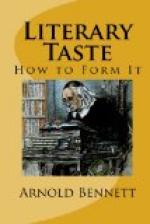The formation of literary taste cannot be completed until that prejudice has been conquered. My very difficult task is to suggest a method of conquering it. I address myself exclusively to the large class of people who, if they are honest, will declare that, while they enjoy novels, essays, and history, they cannot “stand” verse. The case is extremely delicate, like all nervous cases. It is useless to employ the arts of reasoning, for the matter has got beyond logic; it is instinctive. Perfectly futile to assure you that verse will yield a higher percentage of pleasure than prose! You will reply: “We believe you, but that doesn’t help us.” Therefore I shall not argue. I shall venture to prescribe a curative treatment (doctors do not argue); and I beg you to follow it exactly, keeping your nerve and your calm. Loss of self-control might lead to panic, and panic would be fatal.
First: Forget as completely as you can all your present notions about the nature of verse and poetry. Take a sponge and wipe the slate of your mind. In particular, do not harass yourself by thoughts of metre and verse forms. Second: Read William Hazlitt’s essay “On Poetry in General.” This essay is the first in the book entitled Lectures on the English Poets. It can be bought in various forms. I think the cheapest satisfactory edition is in Routledge’s “New Universal Library” (price 1s. net). I might have composed an essay of my own on the real harmless nature of poetry in general, but it could only have been an echo and a deterioration of Hazlitt’s. He has put the truth about poetry in a way as interesting, clear, and reassuring as anyone is ever likely to put it. I do not expect, however, that you will instantly gather the full message and enthusiasm of the essay. It will probably seem to you not to “hang together.” Still, it will leave bright bits of ideas in your mind. Third: After a week’s interval read the essay again. On a second perusal it will appear more persuasive to you.




